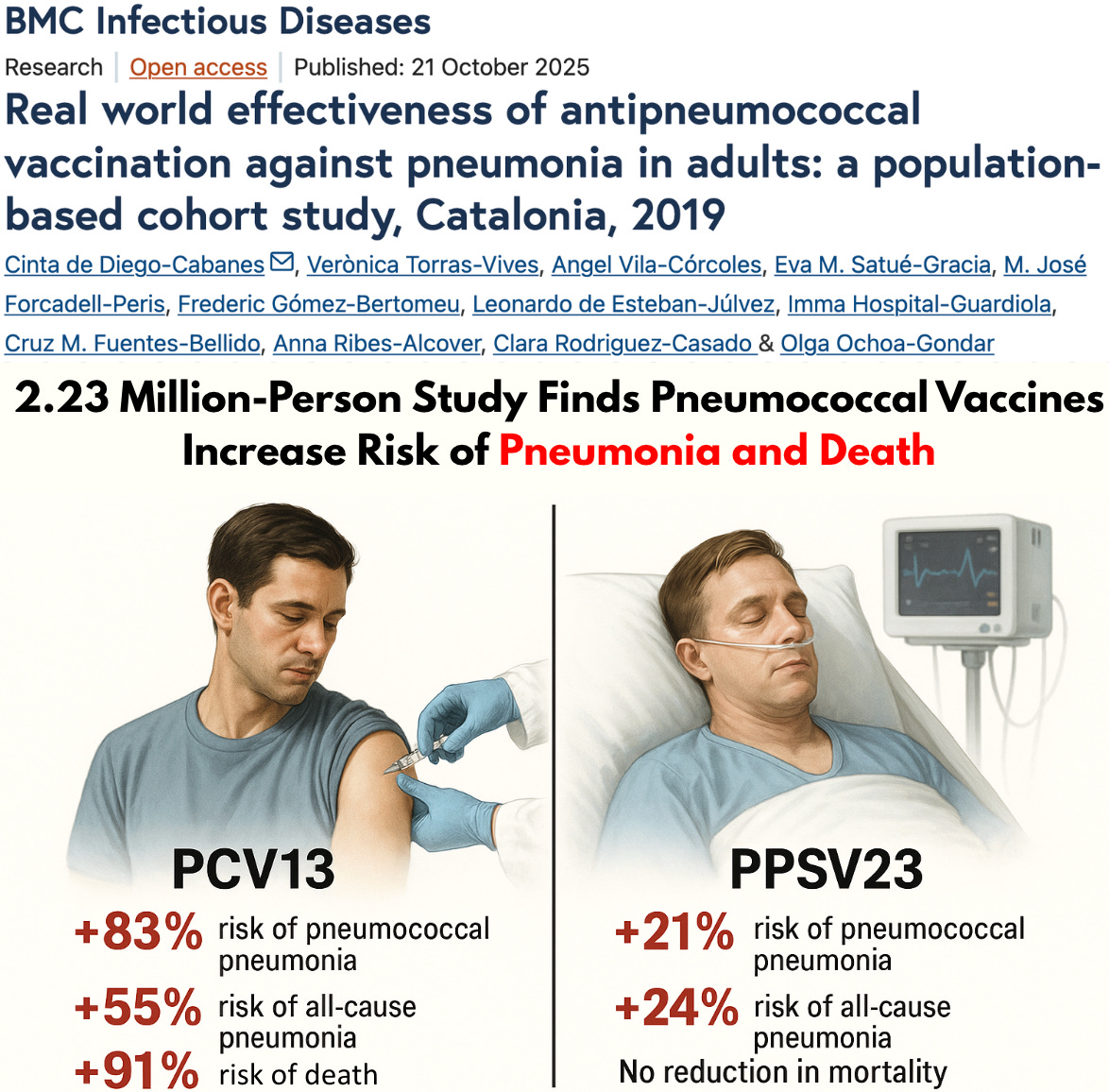BREAKING: 2.23 Million-Person Study Finds Pneumococcal Vaccines Increase Risk of Pneumonia and Death
The vaccines given to nearly every U.S. child and senior were linked to higher pneumonia and death rates in one of the largest real-world studies ever conducted.
For decades, U.S. and European health authorities have promoted pneumococcal vaccination as an “essential” tool to prevent serious bacterial pneumonia, meningitis, and sepsis caused by Streptococcus pneumoniae.
In the United States, the CDC’s Advisory Committee on Immunization Practices (ACIP) currently recommends:
Infants and children <5 years: a 4-dose series of a pneumococcal conjugate vaccine—PCV15 or PCV20—at 2, 4, 6, and 12–15 months.
Adults ≥50 years (PCV-naïve or unknown history): one dose of a PCV—PCV15, PCV20, or PCV21. If PCV15 is used, give PPSV23 one year later (minimum 8 weeks for certain high-risk conditions).
These vaccines are given to tens of millions of Americans every year.
Now, a landmark population-based study published in BMC Infectious Diseases has shattered the rationale for current pneumococcal conjugate vaccine (PCV) recommendations. Analyzing outcomes among 2,234,003 adults aged 50 and older in Catalonia, Spain, the authors found that recipients of both PCV13 and PPSV23 were significantly more likely to be hospitalized for pneumonia and more likely to die from pneumonia-related causes compared to their unvaccinated counterparts—even after adjusting for age, sex, comorbidities, and influenza vaccination status.
Adjusted Risk (Hazard Ratios):
After controlling for age, sex, influenza vaccination, and major comorbidities:
PCV13:
1.83× higher risk of pneumococcal pneumonia (95% CI 1.49–2.24).
1.55× higher risk of all-cause pneumonia (95% CI 1.42–1.70).
1.91× higher risk of death from all-cause pneumonia (95% CI 1.45–2.52).
PPSV23:
1.21× higher risk of pneumococcal pneumonia (95% CI 1.10–1.36).
1.24× higher risk of all-cause pneumonia (95% CI 1.18–1.31).
No reduction in mortality.
Even in those for whom vaccination is most strongly recommended—elderly (≥65 years), immunocompromised, or those with chronic heart, lung, or metabolic disease—no protective effect was observed.
Rather than preventing pneumonia, pneumococcal vaccination was linked to a measurable increase in pneumonia hospitalizations and deaths. Even after extensive multivariable adjustment for age, comorbidities, and prior flu vaccination, both PCV13 and PPSV23 remained independently associated with poor outcomes.
The authors concluded that their findings “raise serious concerns about effectiveness and public health impact” of adult pneumococcal vaccination programs.
Although newer pneumococcal conjugate vaccines—PCV15, PCV20, and PCV21—have recently replaced PCV13 in the United States, they are built on the same biological platform. Each newer version contains all of the same serotypes included in PCV13, plus additional ones, using the same diphtheria-derived carrier protein (CRM197) and aluminum adjuvant system. In other words, the composition and immune mechanism remain essentially identical—only the number of serotypes has expanded.
Since its introduction in 2010, PCV13 has been administered to tens of millions of Americans, including nearly every child and most seniors, forming the backbone of the national pneumococcal vaccination program. The older 23-valent polysaccharide vaccine (PPSV23), which was also evaluated in the study, continues to be widely used today—still recommended by the CDC for adults who receive PCV15, and as a catch-up option for certain risk groups.
The new BMC Infectious Diseases findings therefore carry serious implications: those who previously received PCV13 or PPSV23 may face the same elevated risks of pneumonia and death observed in this large-scale study, and these risks could plausibly persist—or even amplify—under the expanded PCV15, PCV20, and PCV21 formulations now in widespread use.
After more than three decades of use in adults and universal promotion in children, this evidence calls into question the entire foundation of pneumococcal vaccine policy and warrants a immediate attention from public health authorities.
de Diego-Cabanes C, Torras-Vives V, Vila-Córcoles A, et al. Real world effectiveness of antipneumococcal vaccination against pneumonia in adults: a population-based cohort study, Catalonia, 2019. BMC Infect Dis. 2025;25(1):1369. Published 2025 Oct 21. doi:10.1186/s12879-025-11596-w
Epidemiologist and Foundation Administrator, McCullough Foundation
Support our mission: mcculloughfnd.org
Please consider following both the McCullough Foundation and my personal account on X (formerly Twitter) for further content.




Apparently they have been trying to kill us much earlier than the Covid death shot!
Every senior I know (except me) has taken this vaccine. I worry for them.